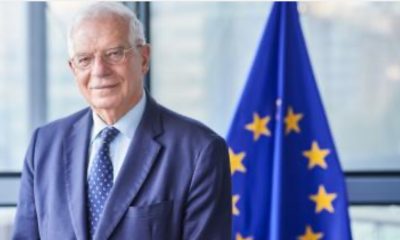Rúis
Éilíonn Putin iarracht chogaidh uile-Rúis agus é ag dearbhú dlí airm san Úcráin áitithe

Russian President Vladimir Putin has announced that he would introduce martial law in four Russian-occupied areas of Ukraine. Moscow claimed these regions last month as its territory but is having trouble defending against Ukrainian advances.
Putin made televised comments to his Security Council members and ordered the creation a special co-ordinating committee under Prime Minister Mikhail Mishustin in order to boost the faltering war effort.
He stated that the entire system of state administration, not just the specialized security agents, must be geared towards supporting Russia's "special military operation".
This package of moves was nearly eight months into an cogadh and marked Putin's latest escalation to counter the series of major defeats since September.
According to the US State Department, Russia was using "desperate tactics". According to a Kyiv official, it would not change anything.
A published Kremlin decree directed an "economic mobilization" in eight areas adjacent to Ukraine, including Crimea which Russia invaded and annexed during 2014.
They were placed in a special regime that was one step below martial law, and it allowed for movement restrictions.
Putin granted additional powers to the leaders of Russia's 80 plus regions in order to preserve critical facilities, maintain order and boost production for the war effort.
It was not clear, however, how effective or fast the new measures would boost Russia's military presence on the ground. These new measures were issued by Russian-installed officials in Ukraine’s occupied Kherson area, who advised civilians that they should leave certain areas as soon possible to avoid an attack from Ukraine.
Russia expert Mark Galeotti stated on Twitter that the moves were "a declaration of variegated Martial Law across the entire of Russia", with some emergency regulation now in effect across the entire country.
He stated that it was not clear whether the regional officials would use these extra powers as Moscow requested, ignore them or exploit them to steal state resources.
According to Russian news agencies, Vladimir Saldo (the Russian-installed acting Governor of Occupated Kherson) confirmed that he would give power to the military. However, many regional chiefs, including Moscow's mayor Sergei Sobyanin, said that they didn't plan to make any changes immediately.
Mykhailo Podolyak, the Ukrainian presidential advisor, stated on Twitter that "this does not change anything about Ukraine: We continue to liberate and de-occupy our territories."
URGENT MEASURES
The Ukrainian gains have forced Putin to take a series of drastic steps in the last month. These include the unpopular call up of hundreds of thousands of additional troops and the unilateral annexation by Ukraine of four regions. This was condemned by the overwhelming majority of countries at the U.N. General Assembly as illegal, as well as a threat of using nuclear weapons to defend Russia's lands.
After months of Kremlin assurances that the campaign was on track, many ordinary Russians have seen the real war for themselves.
Putin and his allies have been harshly critical of the failures of the military, as well as the chaotic state at mobilisation. This has led to hundreds of thousands of people fleeing abroad.
Some regions resort to public appeals in order to provide basic equipment for newly mobilised soldiers to go to the front, a problem that Putin implicitly acknowledges.
No matter the task, soldiers must have everything they need. He said that this includes equipment for barracks and places where soldiers are deployed, living conditions, food, and medical care.
"We have every chance to solve all the problems that arise here – and they do exist at a modern level worthy of our country."
Paul Stronski of the Carnegie Endowment for International Peace is a Russia expert. He said Putin was placing more responsibility upon regional heads by ordering them to war, but without explaining what they needed to do.
Stronski, an ex-Russia specialist at the US State Department said that the president's orders exemplified Moscow's efforts to implement a successful war plan.
He said that Putin had a vision seven years ago. "It's gone horribly wrong, and he still doesn't know how to fix it."
Comhroinn an t-alt seo:
-

 ComhdhálachaLá ó shin 3
ComhdhálachaLá ó shin 3Chuir póilíní na Bruiséile stop le comhdháil ar-uaire NatCon
-

 Faireachas maisLá ó shin 4
Faireachas maisLá ó shin 4Sceitheadh: Teastaíonn ó airí inmheánacha an AE iad féin a dhíolmhú ó bhulcscanadh rialaithe comhrá ar theachtaireachtaí príobháideacha
-

 ComhdhálachaLá ó shin 4
ComhdhálachaLá ó shin 4Comhdháil NatCon le dul ar aghaidh ag ionad nua sa Bhruiséil
-

 An tSeirbhís Eorpach Gníomhaíochta Seachtraí (EAAS)Lá ó shin 4
An tSeirbhís Eorpach Gníomhaíochta Seachtraí (EAAS)Lá ó shin 4Scríobhann Borrell a phostthuairisc

























